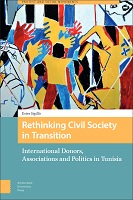Rethinking Civil Society in Transition
International Donors, Associations and Politics in Tunisia
Abstract
This book illustrates the results of ethnographical research designed to shed light on the notion of civil society in a context characterized by the transformation of power relations. Such transformation is given by shifting resources, renewed local and international opportunities, and a general reframing of goals and objectives. The academic literature has usually relied on a substantialist understanding of the notion of civil society – referring to the latter as something that exists a priori or does something. This volume relies, instead, on a relational approach – where civil society becomes the name we give to a host of complex interactions in which local associations are involved in a time of reconfiguration of power relations. Building on this approach, this volume analyses the relational dynamics affecting Tunisian associations after the fall of the authoritarian regime in 2011 and their implications for the changing political order. Findings show two main interrelated trends: the nationwide professionalization of local associations and the localized networking strategies of various socio-political categories crossing the associational sector. The book shows how their members understand the standardization of local associations as a strategy to have guaranteed access to the public sphere and, therefore, to influence the changing political order.
Keywords
Tunisia, civil society, associations, international donors, politicsDOI
10.5117/9789463727976ISBN
9789463727976, 9789048555956Publisher
Amsterdam University PressPublisher website
https://www.aup.nl/Publication date and place
Amsterdam, 2023Grantor
Series
Protest and Social Movements, 26Classification
Human rights, civil rights
Non-governmental organizations (NGOs)
Politics and government


 Download
Download